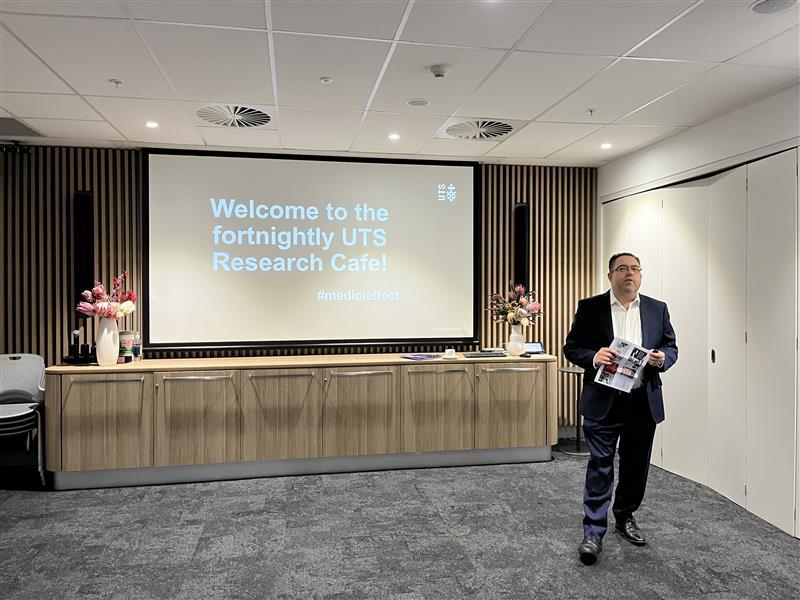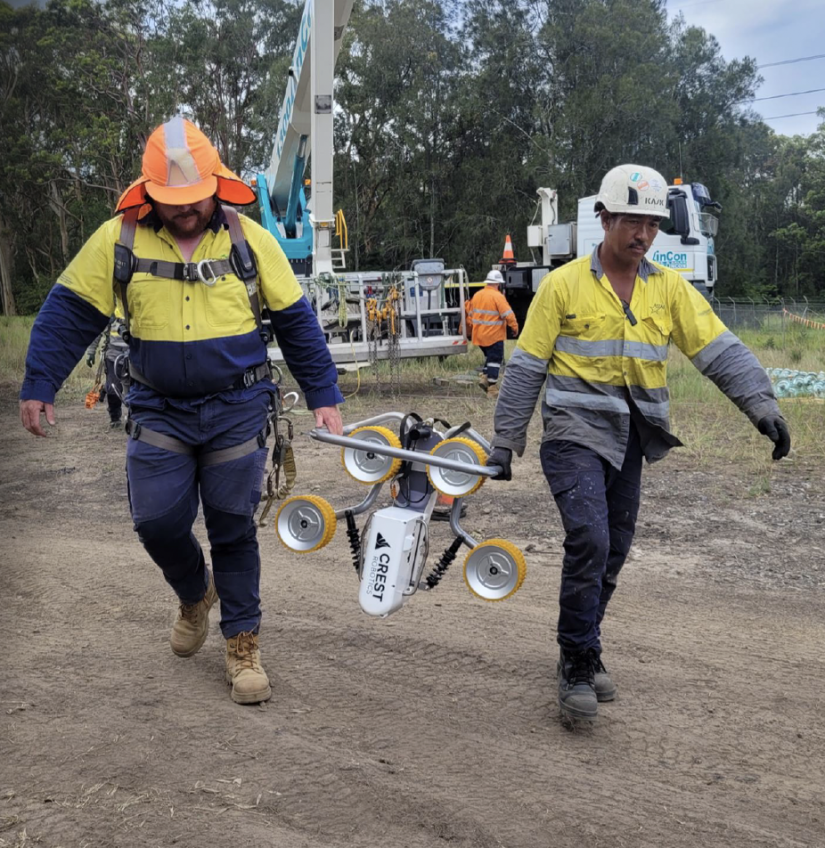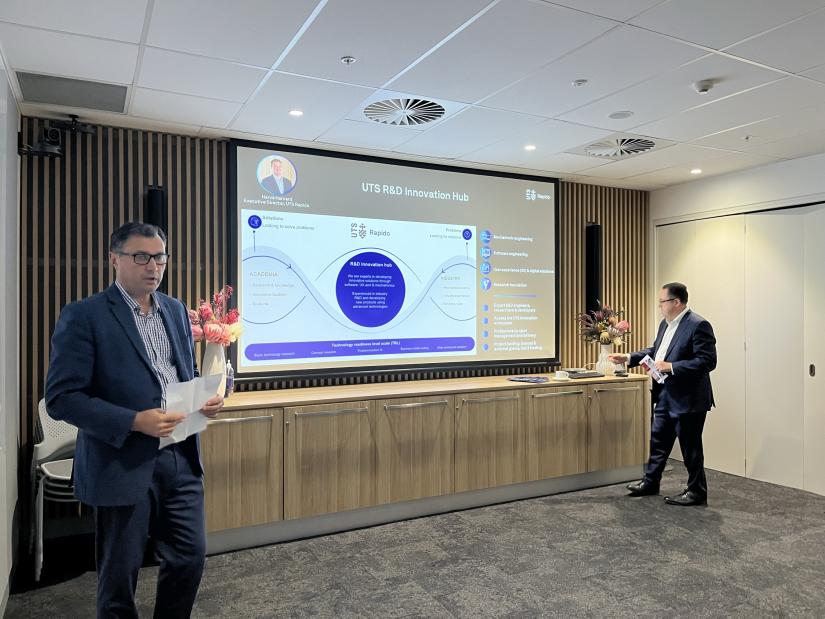In this week’s Research Cafe, led by Pro Vice-Chancellor of Business Creation & Major Facilities, Professor Michael Blumenstein, our speakers discussed engaging with industry, commercialising research, research training opportunities and high-performance computing resources.
Innovate and collaborate at Research Cafe

Professor Michael Blumenstein speaking at Research Cafe
Michael opened the session by talking about the purpose of Research Cafe, "Research Cafe is about bringing together people from across the university, breaking down silos and exchanging ideas."
"This is the place to catch up and meet people, and maybe cross-fertilise some ideas and opportunities for collaboration."
Accelerate your research
Engagements Manager at the Australian Research Data Commons (ARDC), Dr. Robin Burgess, introduced the Nectar Research Cloud, offering free access to high-performance computing resources.
“The Nectar Research Lab provides the research community with fast, interactive self-service access to large scale computing infrastructure and applications,” Robin said.
“You can use resources like virtual machines launch research applications and use large memory servers to accelerate your research.”
The Nectar Research Lab provides the research community with fast, interactive self-service access to large scale computing infrastructure and applications.
Nectar Research Cloud also manages other services such as Jupiter Notebooks, a powerful tool for sharing and storing code.
Sign up for free with the Nectar Research Cloud and explore the free resources available.
Access the research cafe slides for links to Nectar Research Cloud and other resources.
Think simple, ask questions

Mechanical and Mechatronics Engineer with Engineering and IT, and Founder and CEO of Crest Robotics, Dr. Clyde Webster, shared his insights on engaging industry, highlighting the importance of simple solutions.
Clyde said, “The research is 10 years ahead of industry. So, when you do go out and you are interacting with industry, note that you can probably solve a big problem of theirs that is a lot simpler than the stuff you're working on.”
He said that the key is to listen and then choose the simple solution.
Clyde gave an example of how he went from a giant 20-degree of freedom climbing robot to a single degree of freedom robot that pulls things along line by engaging researchers.
The research is 10 years ahead of industry. So, when you do go out and you are interacting with industry, note that you can probably solve a big problem of theirs that is a lot simpler than the stuff you're working on.
He shared that his favourite thing about the new design is it is light and therefore able to be carried around easily and deployed at heights.
“We solved a simple problem and we made off the bat a $400k sale to get us going,” he said.
“If you are looking to engage industry, remember they’re a little bit behind the research,” he concluded. “Think simple. Ask questions.”
Collaborate with Rapido

Executive Director of Engineering and IT Solutions and Founder of UTS Rapido, Herve Harvard, discussed Rapido’s role in commercialising research.
Herve shared how he founded Rapido to help UTS engage with industry.
“Rapido currently have about 30 R&D (Research and Development) engineers in software mechanics and user experience,” he said. “And Rapido’s expertise is in developing technology solutions that have a high level of quality.”
He drew attention to the importance of quality as researchers move to work in commercialisations, “That’s our expertise. We can work on solutions that can support commercialisation.”
“We do that across software, where we absolutely know how to develop, deploy and evolve software solutions by background software. We can do product quality software solutions, including mechatronic.”
“We can do what it called ready to manufacture prototypes, and for the user experience, we can identify, help identify market opportunities and define product opportunities based on those market opportunities.”
That’s our expertise. We can work on solutions that can support commercialisation.
He said, “That is very important when you have research output. Sending an algorithm out there is not going to do much, but understanding where that algorithm can be used in the market is critical for success in successful commercialisation.”
Rapido’s R&D projects fit into 3 categories:
- Industry led projects
- Academic led projects
- Internally funded grants and projects
Herve also explained how Rapido differs from other research centres, “We’re operating more on a profit-centre rather than cost-centre as the vast majority of our staff are externally funded. We have to find external funding, or we can’t renew those contracts,” he said. “This means we can’t pursue personal interest, and we need more money to engage and to keep the operation going.”
Herve said Rapido welcome collaboration with anyone across all faculties, “We have active collaborations with health, law, business, science and engineering and we work across all faculties. We are happy to work with anybody.”
Connect with Rapido to discuss potential collaborations and industry engagement opportunities.
Attend the Library Research Workshop Series
Senior Specialist and Data Librarian at UTS Library, Ria Hamblett introduced the Library Research Workshop Series, “Throughout May we've got a whole range of workshops across a topics related to research, right across the research lifecycle.”
“I wanted to remind you that we have these specialists within the library working within all these areas, and we very much want to hear from you if you want support in any of these areas,” she said.
“From designing an effective search strategy or figuring out the difference between a systematic search and a review, and how to do a systematic review, copyright, data management, all the rest of it.”
Reach out to UTS Library to learn more about research workshops and how to access their support services.
Learn more about Research Cafe and access slides from past presentations.
Email REShub@uts.edu.au to receive the calendar invitation.